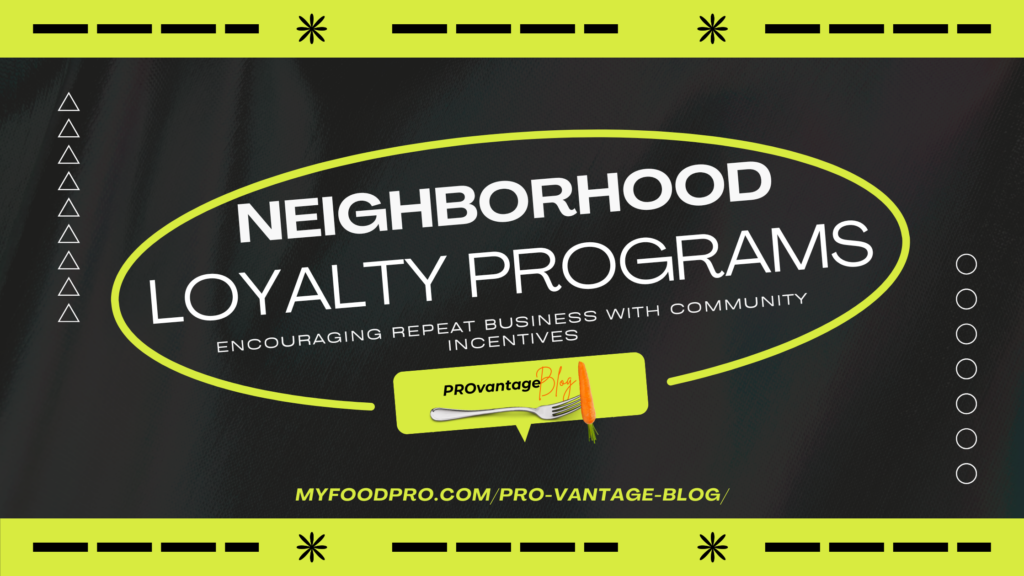Neighborhood Loyalty Programs

Encouraging Repeat Business with Community Incentives
In an era where competition is fierce and customers have countless dining options, chefs and food service operators face unique challenges in building and maintaining a loyal customer base. One powerful tool to address these challenges is the neighborhood loyalty program. By offering community-based incentives, these programs not only drive repeat business but also foster a sense of community, enhance customer relationships, and boost local economies.
What Are Neighborhood Loyalty Programs?
Neighborhood loyalty programs are initiatives designed to reward customers for frequenting local establishments. These programs are particularly effective in the food service industry, where repeat business is crucial. By focusing on a specific geographic area, neighborhood loyalty programs encourage residents to dine locally, benefiting both the customers and the businesses involved.
Benefits of Neighborhood Loyalty Programs for Chefs and Food Service Operators
1. Increased Customer Retention
For chefs and food service operators, retaining customers is key to a long term success. Neighborhood loyalty programs offer incentives such as discounts, free dishes, or exclusive dining experiences, encouraging customers to return more often. This not only increases sales but also helps build lasting relationships with patrons.
2. Enhanced Community Engagement
Neighborhood loyalty programs help create a strong sense of community by encouraging residents to support local dining establishments. When customers feel connected to their local restaurants and cafes, they are more likely to become repeat patrons. This sense of community can also lead to increased word-of-mouth referrals and a more vibrant local dining scene.
3. Boosted Local Economy
By encouraging residents to dine locally, neighborhood loyalty programs help keep spending within the community. This supports local jobs, contributes to the overall economic health of the neighborhood, and enhances the quality of life for residents. A thriving local economy benefits everyone, including chefs and food service operators.
4. Collaborative Marketing Opportunities
Neighborhood loyalty programs offer chefs and food service operators the chance to collaborate on marketing efforts. By partnering with other local businesses, restaurants can pool resources and cross-promote each other. This collaborative approach can lead to innovative marketing campaigns that attract new customers and strengthen community ties.
Examples of Successful Neighborhood Loyalty Programs for Food Service Operators
- The Brooklyn Dining Passport
In Brooklyn, New York, the Brooklyn Dining Passport program encourages residents to explore local restaurants by offering exclusive discounts and special offers. Participating eateries range from upscale restaurants to casual cafes. Passport holders enjoy unique deals, while restaurants benefit from increased foot traffic and customer loyalty.
- The Downtown Frederick Gift Card:
This Gift Card is available through the Downtown Frederick Partnership Program’s website. It is a versatile and thoughtful gift option that can be used at any participating restaurants and attractions in Downtown Frederick. Visitors purchasing and using this gift card, directly support local businesses, contributing to the vibrant local economy. The gift card offers flexibility and convenience, making it perfect for any occasion, and encourages recipients to explore and discover new favorite spots within the historic downtown area. For businesses located in Downtown Frederick, joining the program is an excellent opportunity to attract more customers and become part of a larger community initiative. To participate as a business or purchase a gift card, visit downtownfrederick.org/giftcards
- The Downtown Asheville Culinary Club
Asheville, North Carolina, boasts a diverse and vibrant dining scene. The Downtown Asheville Culinary Club offers a points-based system where customers earn points for every dollar spent at participating restaurants. These points can be redeemed for rewards like gift cards, exclusive dining experiences, and chef’s table events, providing an added incentive for repeat visits.
Implementing a Neighborhood Loyalty Program
For chefs and food service operators looking to implement a neighborhood loyalty program, consider the following steps:
1. Partner with Local Businesses
Collaborate with other local businesses, such as cafes, bakeries, and specialty food shops, to create a comprehensive loyalty program that benefits all participants. This can help increase the program’s appeal and reach a wider audience.
2. Offer Meaningful Rewards
Ensure that the rewards offered are enticing and relevant to your customers. Consider offering discounts, free dishes, or exclusive dining experiences that reflect the unique qualities of your establishment.
3. Promote the Program
Effectively promote your loyalty program through various channels, including social media, email newsletters, and in-store signage. Encourage your staff to inform customers about the program and its benefits.
4. Engage with Your Community
Engage with your local community by hosting events, participating in neighborhood activities, and collaborating with other businesses. Building strong community ties can enhance the effectiveness of your loyalty program and create a loyal customer base.
By implementing a neighborhood loyalty program, chefs and food service operators can create a loyal customer base, foster a sense of community, and contribute to the local economy. These programs offer a win-win solution, driving repeat business while enhancing the overall dining experience for customers.
Source: FoodPRO Marketing Team






